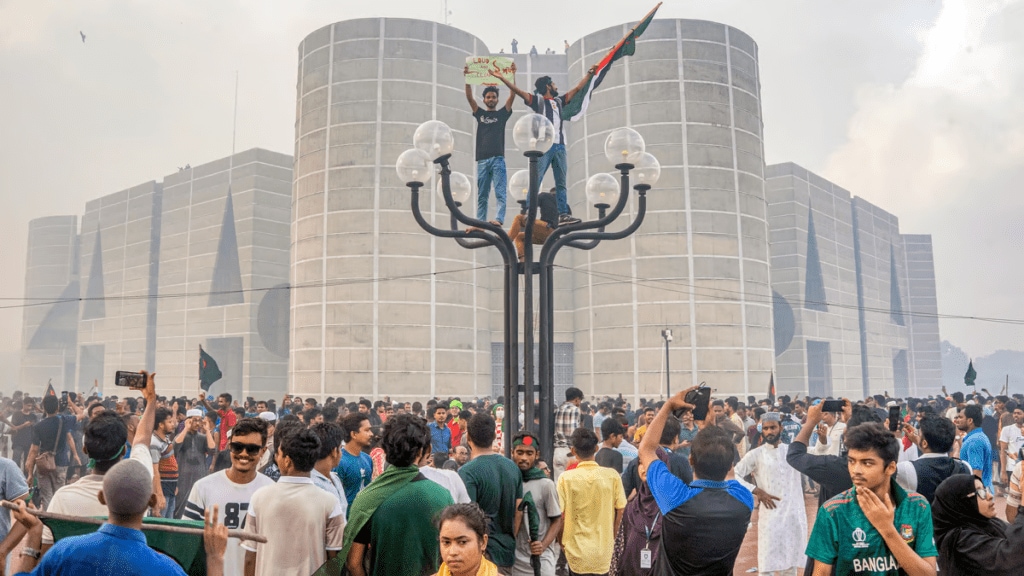In the wake of the protest in Bangladesh, here is a look at the impact across the region. South Asia has been experiencing a wave of political upheavals and instability over the past few years. Key events include the military coup in Myanmar, the fall of Afghanistan to the Taliban, widespread protests in Sri Lanka, and the recent unrest in Bangladesh. These developments have significant implications for India, given its geographical proximity and strategic interests in the region.
Myanmar: A Shift Back to Military Rule
In February 2021, Myanmar‘s military seized power, overthrowing the democratically elected government led by Aung San Suu Kyi. The coup led to widespread protests and a violent crackdown, resulting in a humanitarian crisis. For India, Myanmar’s instability is particularly concerning due to its shared border and the potential for increased insurgency and refugee flows. The turmoil also complicates India’s Act East policy, which aims to strengthen ties with Southeast Asia through enhanced connectivity and cooperation.
Afghanistan: The Taliban’s Return to Power
The rapid takeover of Afghanistan by the Taliban in August 2021 marked a significant shift in the regional power dynamics. The collapse of the Afghan government raised concerns about the resurgence of terrorist groups, human rights violations, and the spread of extremism. India’s concerns are multifaceted, ranging from the safety of its investments in Afghanistan to the security implications of a Taliban-ruled state. The situation poses a direct threat to India’s national security, as extremist groups could gain a foothold in the region, potentially leading to cross-border terrorism.
Sri Lanka: Economic Crisis and Public Unrest
In 2022, Sri Lanka faced a severe economic crisis, characterized by shortages of essential goods, fuel, and foreign exchange reserves. This led to widespread public protests and political instability. For India, the situation in Sri Lanka is significant due to the close geographical and cultural ties between the two nations. The economic turmoil and potential for a humanitarian crisis could lead to an influx of refugees into India. In response, India has provided financial aid and essential supplies to support Sri Lanka during this challenging time.
Bangladesh: Political Unrest and Rising Tensions
In 2024, Bangladesh experienced significant political unrest following the resignation of Prime Minister Sheikh Hasina. The protests, fuelled by economic issues and political dissatisfaction, have led to a volatile situation. The targeting of minority communities and the involvement of radical groups add to the complexity of the crisis. For India, the instability in Bangladesh poses a threat from the eastern front, potentially leading to increased border tensions and security challenges.
Implications for India
These crises in neighbouring countries pose several challenges for India. The primary concerns include:
Security Threats: The rise of extremist groups and the potential for increased terrorism and insurgency.
Humanitarian Concerns: The possibility of refugee influxes and the associated social and economic challenges.
Diplomatic Relations: Strained relations with neighbouring countries due to political instability and differing strategic interests.
India’s Strategic Response
In response to these developments, India is likely to adopt a multifaceted approach, including:
Diplomatic Engagement: Strengthening ties with affected countries and international partners to manage the crises.
Humanitarian Assistance: Providing aid and support to alleviate humanitarian suffering in neighbouring countries.
Security Measures: Enhancing border security and intelligence capabilities to counter potential threats.
In summary, the current regional instability presents significant challenges for India. As a major player in South Asia, India must navigate these complex situations carefully, balancing its security concerns with humanitarian and diplomatic efforts to maintain stability in the region.


